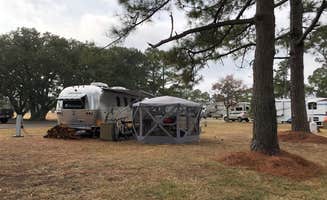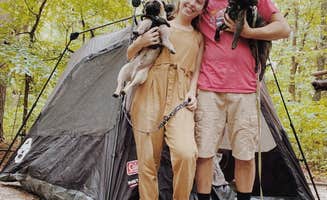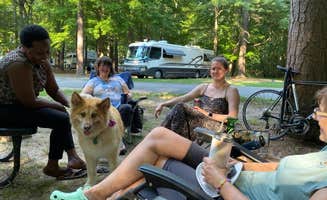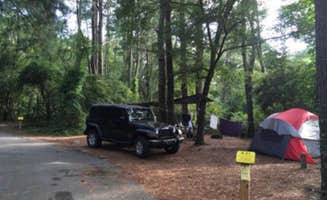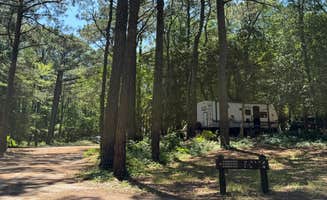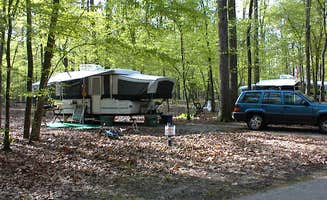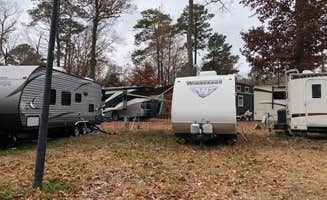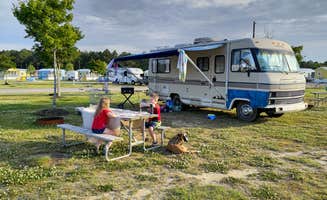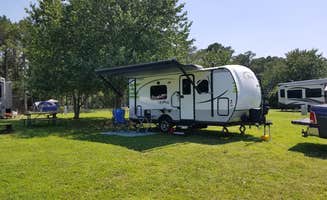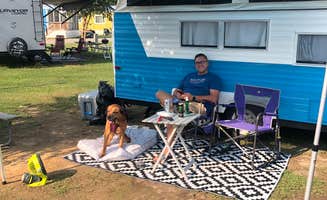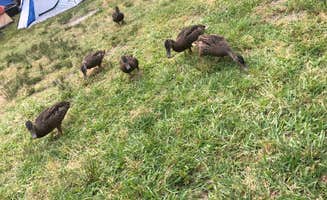Fort Monroe sits on a peninsula at the mouth of the Chesapeake Bay, with water on three sides and elevations rarely exceeding 10 feet above sea level. The area receives about 47 inches of rainfall annually with humid summers that can reach 90°F and mild winters averaging 40-50°F. Campers typically encounter strong coastal breezes at most camping sites near Fort Monroe, Virginia, particularly at waterfront locations.
What to do
Paddling opportunities: At Sandy Bottom Nature Park, campers can rent kayaks and paddle boats for exploring the small lake. "Lots of hiking trails to walk & turtles in the lake!! Plus you can rent boats for a cheap price which we will probably go back to do," reports one visitor to Sandy Bottom Nature Park.
Fishing and crabbing: The waters around the peninsula support diverse fishing options year-round. "You are surrounded by water. The rate was 30 a night for a tent site. No water or electric. I watched birds catch crabs next to the bathhouse," shares one camper who stayed at The Colonies RV and Travel Park.
Historical exploration: The Fort Monroe area contains significant Civil War sites and maritime history. "While there you must check out the Fort Monroe Casement Museum. You have water on two sides with excellent walking area," suggests a visitor. Many campers use the location as a base for visiting multiple historical attractions within a short drive.
Beach activities: Multiple beaches with varying characteristics are available. A camper at Kiptopeke State Park Campground notes, "This park is a nice place to bring your family to camp, fish, crab and relax by the beach and collect seashells. It has 2 beautiful beaches, one that allows pets and the other does not."
What campers like
Privacy levels: Many campgrounds offer secluded sites despite their proximity to urban areas. "Large, private sites among really cool, bent trees. Clean, up-to-date facilities," writes a camper about First Landing State Park Campground.
Dual water access: The unique geography provides both bay and ocean access. "Beach, dump, firewood, showers, fire pit, store, ice picnic table, playground, toilets, concrete pads, horseshoes, trash. A wonderful spot for a campground on the Historic Fort Monroe," explains a reviewer at The Colonies RV and Travel Park.
Winter camping options: Off-season camping offers quieter conditions and lower rates. One visitor to Virginia Beach KOA explains, "Prices come way down during the off season. Much of the facilities are closed but they keep open one of their bathhouses. Otherwise it's a peaceful stay in the winter months."
Military history: The area's naval and military significance adds depth to the camping experience. A visitor to Newport News Park noted, "The park is a civil war historic site and is close to a lot of other historic places." Many campers appreciate the historical context while enjoying modern amenities.
What you should know
Weather considerations: The region experiences significant summer humidity and heat. "The campsites were ok, easy to get to. I wouldn't recommend tent camping in the middle of summer - my husband and i both got sick. The beach was nice and quiet, and the water wasn't too cold," cautions a First Landing State Park visitor.
Noise factors: Several campgrounds experience ambient noise from nearby military installations or highways. A camper at Newport News Park mentions, "There is some road noise from I-64, but not too bad if you stay deeper into the park and away from the lake."
Site selection importance: Campsite quality varies significantly within each campground. "If you go to the southern side of the park near the beach that you will be very close to a US military base called Fort Story. You may hear occasional machine guns and artillery. You will also hear reveille in the morning," advises a First Landing camper.
Seasonal popularity: Summer months bring significantly higher occupancy. One Kiptopeke visitor noted, "Park usually fills up when I'm there," while another camper mentioned that First Landing provides "great campground for couples or family. Beach is awesome, not crowded at all."
Tips for camping with families
Multiple pool options: Some campgrounds feature extensive aquatic facilities beyond beach access. "The campground does offer rental bikes but we brought our own this year and rode the quick 3 miles to the boardwalk during the day. This is not your normal campground and has a resort feel for a decent price," explains a Virginia Beach KOA visitor.
Educational experiences: Nature centers and ranger programs provide learning opportunities. One Sandy Bottom Nature Park visitor shared, "This is a beautiful 456 acre education and wildlife facility. Born from garbage dumps and it is great example of what can be achieved. This really is a great site."
Transportation options: Some campgrounds provide shuttle service to beaches and attractions. "They have transportation via Trolly bus that comes through frequently throughout the day to transport you to various beach side activities where otherwise you would have to pay for parking," notes a Virginia Beach KOA camper.
Safety considerations: Bathhouses may be distant from tent sites. A Sandy Bottom Nature Park visitor explains, "The bathrooms were flush toilets and running water faucets and located behind the parking lot, so a bit of a hike in the dark if you need to go."
Tips from RVers
Leveling challenges: Many waterfront sites require additional equipment. A Newport News Park camper advised, "Many are deceptively unlevel, particularly on the outside of the loops, and are heavily wooded. Some loops are primitive, some have only 20A service and some have 30A service and water hookup."
Site selection strategy: Shade varies significantly at most campgrounds. At Kiptopeke State Park, "1st two rows of sites have almost ZERO tree cover. 1st row not very level sites. Not quite as spacious/spread out sites as other state parks, but it's on the bay!"
Utility requirements: Water connections may require longer hoses than standard. A Newport News Park visitor noted, "You need at least a 25' hose," after experiencing connection challenges. Other campers mentioned that "AT&T had 2 bars and 6 MB/s w/o a booster, 3 bars and 8 MB/s with it."
Connectivity options: Cell reception varies throughout the region. According to a remote worker at Virginia Beach KOA, "I'm here for hybrid remote work and the T-Mobile signal is nice and strong for my needs, both for work and entertainment. Easy to get in and out of the campground."


